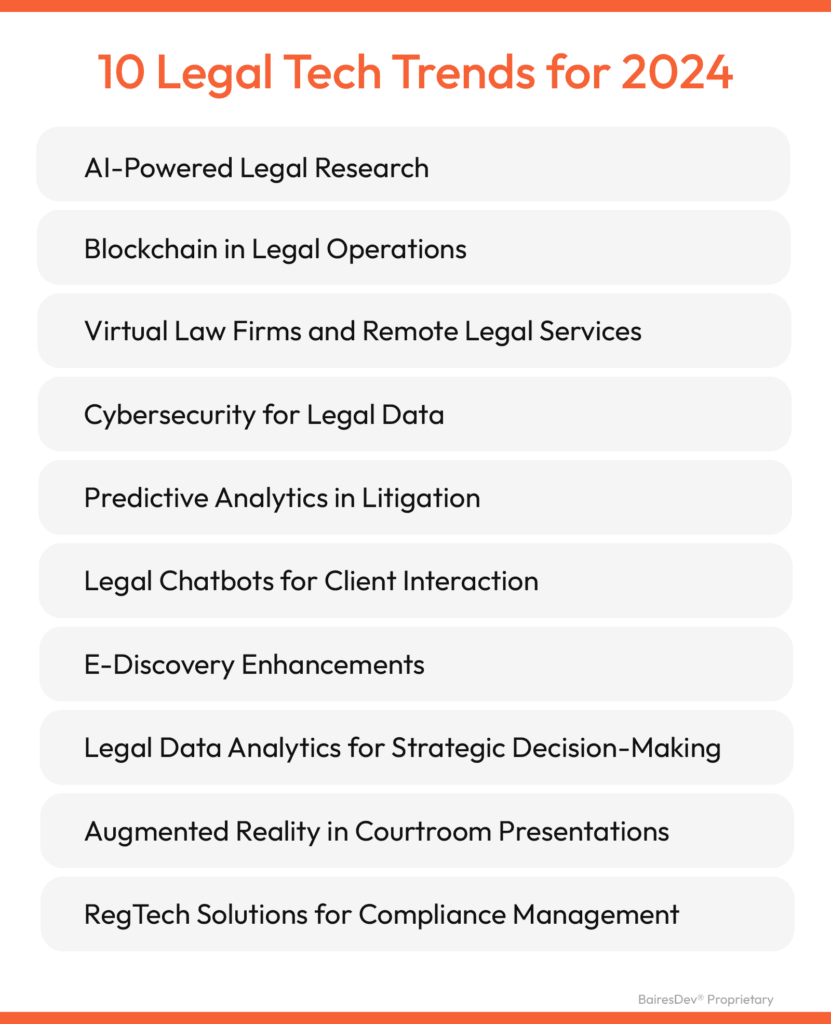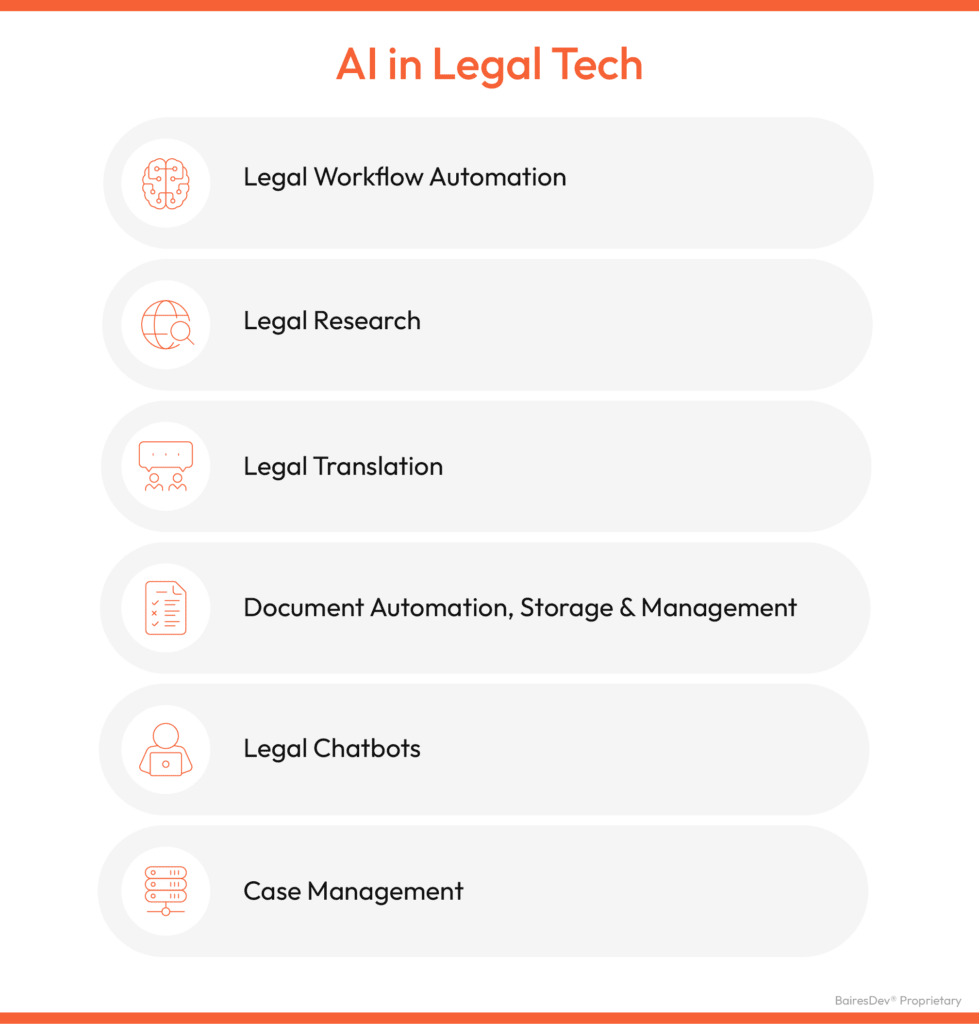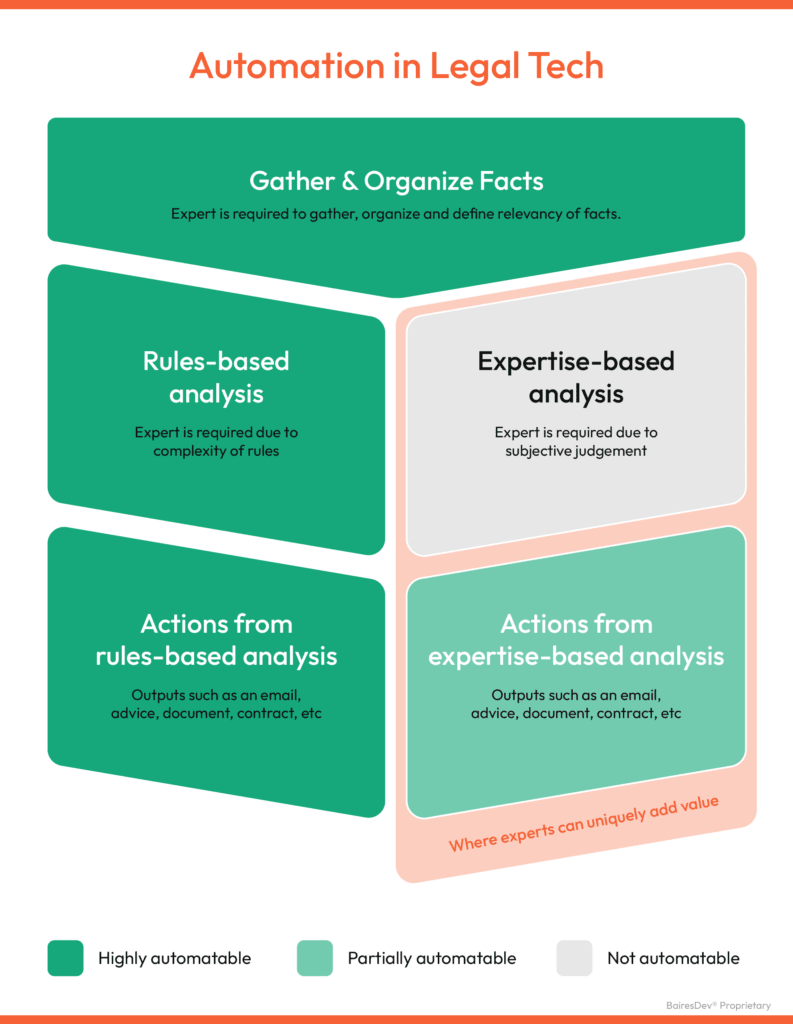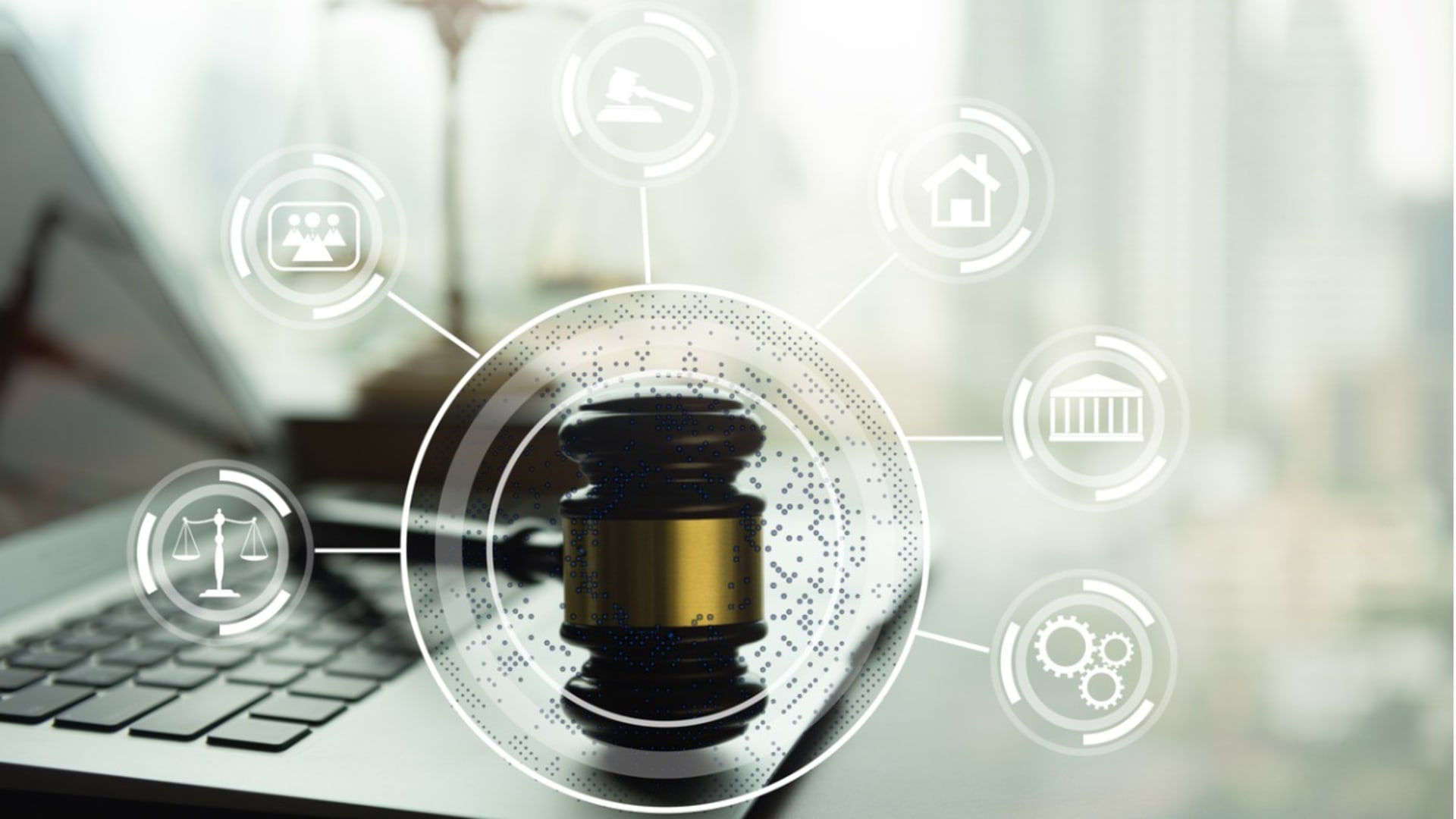Legal tech, short for legal technology, is our umbrella term for any software or tech tool that lawyers and law firms use to streamline their work processes. Now, we’re not just talking about some high-tech gavel here. These tools range from document storage systems to AI-powered contract analysis software. This growing field is estimated to reach USD 45.73 billion by 2030. This speaks for its relevance and current impact as tech solutions are leveraged across all economic activities.
As we all know, law is an old profession with its roots firmly planted in tradition. Despite this challenge, the adoption of legal tech is on the rise. It promises efficiency and accuracy — two things legal areas love.
Take contract analysis software, for example. In the past, reviewing contracts was a laborious process that involved manually going through pages upon pages of dense text. We can now quickly scan documents for key terms and potential issues with AI-powered software.
Let’s explore the current state of legal tech — its solutions and opportunities, as well as its challenges.
Current Landscape of Legal Tech
The latest trends in legal technology simplify operations and redefine how we perceive legal services. For instance, artificial intelligence (AI) and machine learning have emerged as powerful allies for law firms. These technologies can analyze mountains of legal data, liberating lawyers from the drudgery of document review and unlocking valuable insights for case management.
Imagine a world where tedious paperwork is replaced by smart algorithms that not only save time but also offer strategic insights into complex cases. Furthermore, immersive technologies like virtual reality are revolutionizing the courtroom experience. Judges, jurors, and lawyers can now visualize evidence or reconstruct crime scenes in a virtual environment, making trials more engaging and comprehensible.
Let’s delve into what exactly “legal tech” means. Legal technology refers to the use of cutting-edge tools and platforms tailored to meet the needs of the legal sector. This includes AI, machine learning, cloud computing, blockchain technology, data analytics, electronic discovery (e-discovery), and more.
As businesses increase their budget allocation for legal tech tools in the post-COVID-19 era, we expect an uptick in legal tech expenditure aimed at boosting productivity. An example of that are some of the rising trends in legal tech for 2024.

Legal tech extends to software tools currently employed to streamline work processes and improve client services. These include document management software, legal research software, contract management software, e-discovery software, brand intelligence platforms, and case management software.
Main Categories of Legal Tech Solutions
We’re seeing a multitude of legal tech solutions emerging, and each one has its unique abilities.
- First up, we have document automation software. It automates the creation of legal documents, filling in repetitive information in record time.
- Next in line are legal research tools. These sift through vast databases of case law and legal literature to find relevant information. These tools can help you build a solid case or even predict outcomes based on historical data.
- Thirdly, we have e-discovery software. These tools help sift through gigabytes of emails, social media posts, and other digital records for evidence relevant to a case.
- Lastly, there’s practice management software. These tools keep everything running smoothly behind the scenes — from managing client relationships to tracking billable hours and invoicing clients.
Each category plays its part in transforming how law is practiced. As technology and the sector unfold, we can expect to see more categories and tools emerge to make legal practices easier, faster, and more reliable.
Legal Tech Advancements for 2024 and Beyond
The legal industry is known for a cautious “watch and wait” approach when it comes to adopting new technology. However, forward-thinking organizations are beginning to see the immense benefits of embracing technological advancements. These range from automating processes and streamlining operations to enhancing customer service and collaboration, all while increasing efficiency and maintaining a competitive edge.
As we venture into 2024, we’ve identified six significant technology cases that are poised to considerably impact the legal industry: artificial intelligence (AI), hybrid and remote work collaboration, cloud computing, workflow automation and customization, mail processing and digitization, along with security and data privacy.
AI can revolutionize our industry by automating mundane tasks such as legal research or document review. It’s crucial that AI tools are utilized responsibly and ethically with good governance. This means establishing clear user policies and being mindful of both the risks and benefits associated with these tools. These are some of AI’s uses in the legal tech industry.

The pandemic showed us that adapting to a remote work model is not only possible but also beneficial. It eliminates the need for office spaces while attracting law talent seeking flexible work options. Tools like Slack or Zoom became indispensable in facilitating communication for distributed law teams. However, this shift toward online collaboration calls for robust information governance policies to ensure data security compliance.
After all, you wouldn’t want your firm’s sensitive data falling into the wrong hands due to a weak security protocol on a third-party cloud-based solution. We’re seeing law firms flocking toward cloud-based solutions due to their flexibility and scalability. These systems are more cost-effective than traditional servers and allow access to data from any location at any time. According to LexisNexis Firm Manager, 41% of the legal community thinks their confidential data stored in the cloud is safe, while 72.4% of legal firms are in favor of cloud adoption. This is good news for cloud service providers, as it translated into increased opportunities for legal tech.
Workflow automation and customization is another trend we’re excited about. This process uses software to automate legal functions such as document generation, time tracking, or client communication. An automated system can generate standard contracts with just a few clicks, saving valuable time.
Digitizing documents is also gaining traction in our industry. By scanning and electronically filing documents, we can process them faster, reduce costs associated with manual processing, and improve accuracy and security. The following is an assessment of automation depending on expertise- and rules-based tasks.

Finally, let’s talk about security and data privacy. Given the sensitive nature of the data law firms handle daily, it’s paramount to prioritize data security and privacy. Staying abreast of regulations like GDPR in the European Union or HIPAA in the United States ensures firms remain compliant.
A Case of Legal Tech
We’ve had the privilege of partnering with a client who happens to be the legal backbone for an impressive roster of over 40,000 attorneys and no less than 60 Fortune 500 companies.
They provide an array of services ranging from court proceedings solutions to transcription services and even video recording. They were keen on harnessing the power of AI to streamline their processes and deliver more efficient legal solutions.
We developed an AI tool tailored specifically for their needs. The result? Technology capable of summarizing a whopping 10,000 legal transcripts per day. That’s five times the previous capacity. Our AI tool can condense a document spanning between 200 and 300 pages into a concise summary in just 3–4 seconds. The tool automatically dissects the text into manageable chunks, then fed into the NLP engine. This engine follows US best practices in legal writing to ensure each summary is accurate, relevant, and legally sound.
Are you thinking about automating workflows, leveraging cloud solutions, or implementing AI to further your legal tech projects? Schedule a call. Let’s discuss your needs.
Conclusion: The Opportunities Legal Tech Brings for Law Practices
Teeming with the potential to enhance efficiency and client satisfaction, custom legal software development is poised to redefine our industry’s landscape.
We’re looking at a future where AI can streamline case management, automate mundane tasks, and even predict legal outcomes based on historical data. Imagine a world where you can delegate document review to an AI assistant while you focus on crafting compelling arguments or building stronger client relationships.
It’s also crucial that we maintain a keen eye on ethical implications and regulatory compliance. For instance, consider an AI system that predicts court decisions based on past rulings. While it could offer strategic insights, there are questions about bias in algorithms.
While technology might make our lives easier in many ways, it won’t replace the need for human judgment and discernment (at least not yet). We believe legal software development presents immense opportunities for law practices to evolve and thrive in this digital age.






